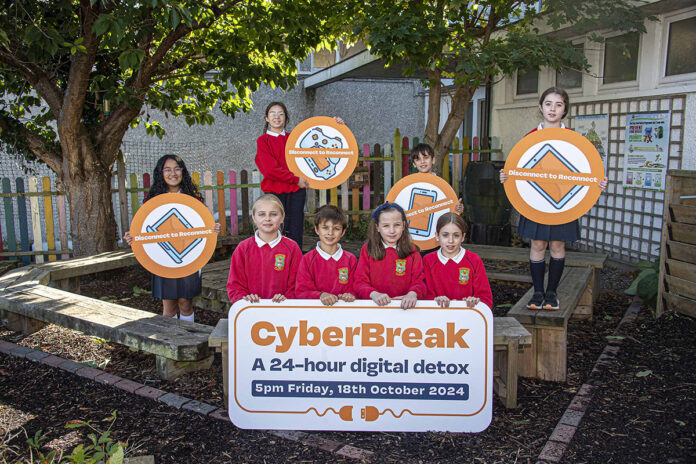
All schools, families and companies across the country are being encouraged to completely ditch their smart devices and take a much needed 24-hour break from the online world later this month, as Ireland’s online safety charity, CyberSafeKids, officially launched its fifth annual CyberBreak.
Research has shown that spending less time online and on smart devices (phones, tablets, laptops, computers and gaming consoles) helps to reduce stress and anxiety, improves the quality of sleep, helps with low mood, as well as boosting mental health and wellbeing for both children and adults. However, with our lives being over scheduled and digitally demanding, this is easier said than done.
Taking a CyberBreak gives families an opportunity to assess how much time they spend online, and how they can find a healthy balance between their online and offline lives, as well as making it a fun-filled and memorable day for the whole family. Over 12,000 people have already signed up to take a CyberBreak this year, which takes place from 5pm on Friday, 18th October to 5pm Saturday, 19th October.
94% OF 8 – 12 YR OLDS OWN A SMART DEVICE
CyberSafeKids’ recently published annual Trends & Usage Report ‘Left To Their Own Devices’, found that a quarter (25%) of primary school children (aged 8-12) and 21% of secondary school children (aged 12-14) have been bothered or upset by harmful content such as scams, harassment, horror and sexual material online.
For 8-12 year olds, this most commonly occurred on YouTube (37%) and Roblox (23%), even though Roblox is widely perceived as a child-friendly social gaming environment. For secondary school children (aged 12-14), Snapchat (41%) and TikTok (30%) were identified as the most common platforms where these negative experiences occur.
Less than half (43%) of primary school children reported having ‘mostly positive’ online experiences in the last year. YouTube (75%), WhatsApp (41%), Roblox (40%), Snapchat (36%) and TikTok (33%) are the most popular platforms for this age group.
TOP TIPS: HOW TO BALANCE YOUR ONLINE AND OFFLINE LIVES
– Try to make sure that your phone is not the first thing that you look at in the morning. Make it an active choice to do something else – stretching, meditating, eating breakfast.
– Avoid using your phone as an alarm clock (there are plenty of alternatives) and try to keep phones, iPads, laptops, etc. out of the bedroom so your device use doesn’t interfere with your sleep.
– Try and make mealtimes, especially if it’s with children, a device-free time.
– Actively decide what you consider to be ‘time well spent’ online. If it’s not endlessly scrolling through social media, then make a deliberate effort to limit it.
– Switch on the “do not disturb mode” on your phone so you won’t receive notifications, messages, or calls for periods of time when you need to focus or switch off.
– Create a family agreement that everybody signs up to, which has identified device-free times e.g., family movie/pizza nights on a Friday.
SIGN UP TODAY
Schools and families can access a range of resources, when they sign up at www.cybersafekids.ie/cyberbreak – Classroom activities; a CyberBreak timetable for pupils and families; a Family Fun Guide, as well as top online safety tips.











